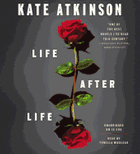
The central conceit of Kate Atkinson's Life After Life is heroine Ursula Beresford Todd's ability to renew her birth. At first, Ursula's power is dedicated to skirting the mishaps and perils of her own Edwardian youth in the bucolic "Fox Corner" outside London; with maturity, she begins to intervene in the fates of family and friends. The novel gains its greatest power as Ursula's narrative strands elongate into overlapping sojourns in wartime Germany and London, including a particularly affecting portrayal of her rescue work in London during the Blitz. The more Ursula experiences life, the more selfless she becomes about her individual existence, leading to an audacious denouement.
The cast of Life After Life is diverse and also gabby; fortunately, Fenella Woolgar is well up to the challenge of performing the dialogue of an Irish scullery maid, an Oxonian snob, a loutish American, a flapperish children's book author and a Nazi sycophant, among many others. When reading Ursula's internal narration, Woolgar's voice quality is reminiscent of Lady Mary's from Downton Abbey (appropriately so, as the beginning of Life After Life takes place in a similar era).
For a listener as opposed to a reader, the un-contextualized flash-forward scene at the beginning of the novel is extra confusing--just keep calm and carry on. As for the heroine's excessively reiterative infancies, once you hear the demise keywords "Darkness fell," listen for her rebirth date of "February 10, 1910" accompanied by the word "snow," and you'll soon catch the drift of another one of Ursula's many interesting lives. --Holloway McCandless, blogger at Litagogo: A Guide to Free Literary Podcasts

